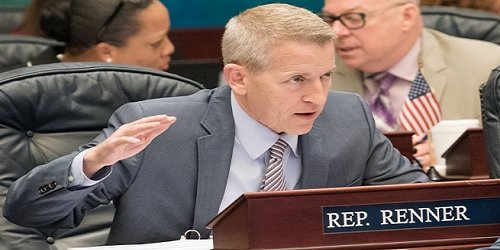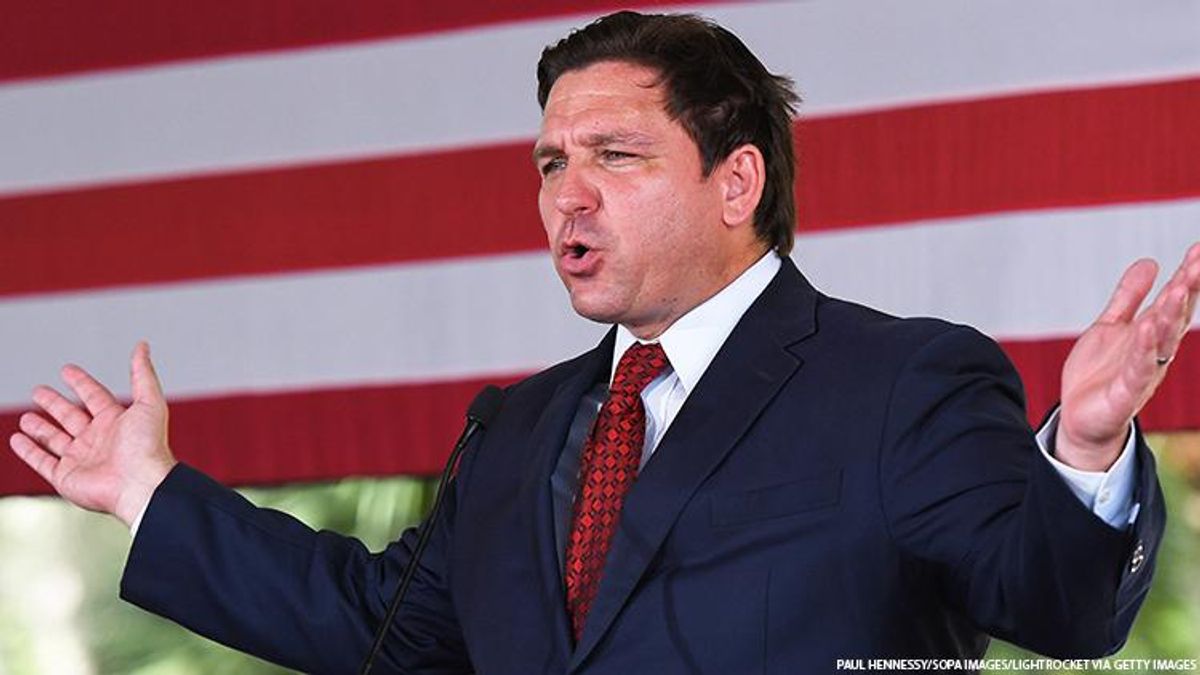The New York Times Book Review panned the latest louche lousy literary effort by pompous wealthy Dull Republican funded feculent fetid privileged Ivy Leaguer RONALD DION DeSANTIS, bigoted, bumptious Boy Governor of the State of FLori-DUH, which my mother would have called a "non-book," a nasty effort by DeSANTIS's staff to position him as if he were a living breathing natural person, instead of just another KOCH INDUSTRIES empty suit:
Preaching Freedom, Ron DeSantis Leads By Cracking Down
In his new book, “The Courage to Be Free,” the Florida governor and potential Republican presidential candidate offers a template for governing based on an expansive vision of executive power.

When you purchase an independently reviewed book through our site, we earn an affiliate commission.
THE COURAGE TO BE FREE: Florida’s Blueprint for America’s Revival, by Ron DeSantis
As governor of Florida, Ron DeSantis has been casting himself as a Trump-like pugilist. But the overall sense you get from reading his new memoir is that of the mechanical try-hard — someone who has expended a lot of effort studying which way the wind is blowing in the Republican Party and is learning how to comport himself accordingly.
Not that he admits any of this, peppering “The Courage to Be Free” with frequent eruptions about “the legacy media” and “runaway wokeness.” But all the culture war Mad Libs can’t distract from the dull coldness at this book’s core. A former military prosecutor, DeSantis is undeniably diligent and disciplined. “The Courage to Be Free” resounds with evidence of his “hard work” (a favorite mantra), showing him poring over Florida’s laws and constitution in order to understand “the various pressure points in the system” and “how to leverage my authority to advance our agenda through that system.” Even the title, with its awkward feint at boldness while clinging to the safety of cliché, suggests the anxiety of an ambitious politician who really, really wants to run for president in 2024 and knows he needs the grievance vote, but is also trying his best to tiptoe around the Trump dragon.
“The Courage to Be Free” resounds with evidence of DeSantis’s “hard work” (a favorite mantra).
What a difference a dozen years make. Back in 2011, a year before DeSantis first ran for Congress, he published “Dreams From Our Founding Fathers” — an obvious dig at Barack Obama, whom DeSantis lambasted for his “thin résumé” and “egotism” and “immense self-regard.” It was a curious book, full of high-toned musings about “the Framers’ wisdom” and “the Madisonian-designed political apparatus.”
His new book will leave some supporters, who have encouraged DeSantis to “humanize himself” for a national audience, sorely disappointed. In his acknowledgments, he thanks “a hardworking team of literary professionals who were critical to telling the Florida story,” but presumably those professionals could only do so much with the material they were given. For the most part, “The Courage to Be Free” is courageously free of anything that resembles charisma, or a discernible sense of humor. While his first book was weird and esoteric enough to have obviously been written by a human, this one reads like a politician’s memoir churned out by ChatGPT.
DeSantis’s attempts at soaring rhetoric are mostly too leaden to get off the ground. “During times of turmoil,” he intones, “people want leaders who are willing to speak the truth, stand for what is right and demonstrate the courage necessary to lead.” Of his childhood baseball team making the Little League World Series, he says: “What I came to understand about the experience was less about baseball than it was about life. It was proof that hard work can pay off, and that achieving big goals was possible.” You have to imagine that DeSantis, a double-barreled Ivy Leaguer (Yale and Harvard Law School), put a bit more verve into his admissions essays. At around 250 pages, this isn’t a particularly long book, but it’s padded with such banalities.
Much of it is given over to laying out what he calls “Florida’s blueprint for America’s revival,” or, as he puts it in his generic summary: “Be willing to lead, have the courage of your convictions, deliver for your constituents and reap the political rewards.” What this has meant in practice looks an awful lot like thought policing: outlawing classroom discussion of sexual orientation through the third grade; rejecting math textbooks that run afoul of Florida’s opaque review process; forbidding teachers and companies to discuss race and gender in a way that might make anyone feel “discomfort, guilt, anguish or any other form of psychological distress.” Florida also has a ban on abortion after 15 weeks — which DeSantis has indicated he would be willing to tighten to six weeks — with no exceptions for rape and incest.
In this regard, all the bland platitudes do serve a purpose. DeSantis’s blunt-force wielding of executive power might sound like a good time for hard-core social conservatives, but if part of the point of this book is to float a trial balloon for a presidential run, you can see the gears turning as he tries to make his message palatable for the national stage. Take out the gauzy abstraction, the heartwarming clichés, and much of what DeSantis is describing in “The Courage to Be Free” is chilling — unfree and scary.
Much of what DeSantis is describing in “The Courage to Be Free” is chilling — unfree and scary.
Of course, DeSantis insists that he’s simply doing his bit to fight “political factionalism” and “indoctrination.” He removed Tampa’s democratically elected prosecutor from office in large part for pledging not to prosecute abortion providers — explaining in the book that he, DeSantis, was just using the powers vested in him by Florida’s state constitution to suspend a “Soros-backed attorney” for “a clear case of incompetence and neglect of duty.” (Last month, a federal judge ruled that DeSantis was in violation of state law.) DeSantis boasts about big-footing companies and local municipalities when he prohibited vaccine mandates and lifted lockdowns. In April 2020, when the president of the Ultimate Fighting Championship expressed annoyance at the possibility of dealing with some “jackass mayor,” DeSantis told him not to worry: “I will overrule any mayor that gives you guys a hard time.”
It’s unclear what happened to the DeSantis of a decade ago, a boilerplate libertarian and founding member of the House Freedom Caucus who was mainly preoccupied with fiscal austerity and privatizing Medicare and Social Security. His 2011 book contained numerous tributes to “limited government.” Now, he says, in his typically windy way, anything he does that looks suspiciously intrusive is in fact a cleansing measure, purging public life of excess politicization: “For years, the default conservative posture has been to limit government and then get out of the way. There is, no doubt, much to recommend to this posture — when the institutions in society are healthy. But we have seen institution after institution become thoroughly politicized.”
Fewer than 20 pages later, DeSantis proposes making about 50,000 federal employees — currently apolitical civil servants — into “at-will employees who serve at the pleasure of the president.” By any measure, this would amount to politicization on steroids.
But despite all the dutiful servings of red meat, DeSantis looks so far to be the favored son of the donor class — which is probably the main audience for this book. The message to them seems to be twofold. First, don’t normalize “the woke impulse”: When Disney’s chief executive criticized Florida’s so-called Don’t Say Gay law (officially titled “Parental Rights in Education”), DeSantis cracked down accordingly. Second, Republican donors can take assurance from “the Sunshine State’s favorable economic climate” that, when it comes to what truly matters to them, it will be business as usual.
Any criticism of his policies gets dismissed as “woke” nonsense cooked up by the “corporate media.”
Reading books, even bad ones, can be a goad to thinking, but what DeSantis seems to be doing in “The Courage to Be Free” is to insist that Americans should just stop worrying and let him do all the thinking for them. Any criticism of his policies gets dismissed as “woke” nonsense cooked up by the “corporate media.” (Rupert Murdoch’s Fox Corporation and News Corp, which owns the publisher of this book, doubtless don’t count.) “I could withstand seven years of indoctrination in the Ivy League,” DeSantis says, only half in jest.
The bullying sense of superiority is unmistakable, even when he tries to gussy it up in a mantle of freedom. DeSantis is not taking any chances: He may have been able to “withstand” the “indoctrination” of being exposed to ideas he didn’t like, but he doesn’t seem to believe the same could be said for anyone else.
THE COURAGE TO BE FREE: Florida’s Blueprint for America’s Revival | By Ron DeSantis | 256 pp. | Broadside Books | $35
Jennifer Szalai is the nonfiction book critic for The Times. @jenszalai





